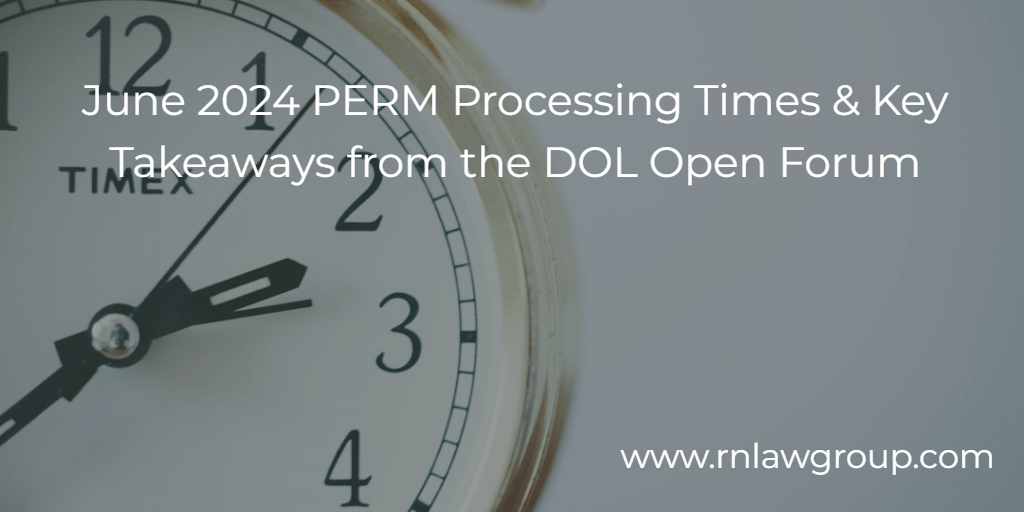
June 2024 PERM Processing Times & Key Takeaways from the DOL Open Forum
The Department of Labor (DOL) issued updated PERM processing times as of June 01, 2024 for PERM applications and prevailing wage determination (PWD) requests. These updates provide crucial information for employers and foreign workers navigating the employment-based green card process. Understanding the current processing times is vital for planning and managing the various stages of the employment-based green card process, making this update a key resource for both employers and employees.
The updated processing times are as follows:
Prevailing Wage Determination Processing Times
The National Prevailing Wage Center (NPWC) is processing PWDs that were filed in December 2023 for OES wages and April 2023 for non-OES wages (this includes private wage surveys). Further, the NPWC is processing redetermination requests submitted in December 2023.
Currently at Reddy Neumann Brown PC, we are seeing PWDs being issued in about 5-6 months.
PERM Processing Times
The DOL is processing PERM applications filed in May 2023 (and earlier). On average, the DOL is adjudicating PERM applications in approximately 387 days.
Further, the DOL is processing audits for PERM applications filed in December 2022. On average, processing times for audit review is 478 days. Therefore, if a PERM application was audited, expect an additional 3 months for adjudication. Also, the DOL is processing PERM reconsideration requests that were submitted in August 2023.
Currently at Reddy Neumann Brown PC, we are seeing PERM applications approved (if not audited) in approximately 12 to 13 months, which is consistent with the average processing times reported by the DOL.
Ongoing PERM Delays and Updates from the DOL Open Forum
PERM Processing times have drastically increased over the last few years with no signs of improvement. In June 2024, officials from the Department of Labor attended the American Immigration Lawyers Association (AILA) conference in Chicago, IL. The DOL indicated that they had a record number of filings in all programs. DOL has requested additional funding from Congress in order to more effectively handle the increase in applications, but that funding has remained largely unchanged. Any increase the DOL has received is offset by inflation. The DOL does receive a portion of the H-1B ACWIA fee, but with the decline in H-1B filings, their funding from this fee has decreased. Additionally, the DOL indicated that it reallocates resources from the PERM program during the peak seasons of the H-2A and H-2B programs in order to meet regulatory deadlines.
The DOL implemented a new ETA Form 9089 (PERM application) and filing system in FLAG in June 2023. The DOL stated that it has about five-thousand PERM applications remaining in the legacy system. Once those applications are adjudicated, the DOL will begin to process those PERM applications filed in FLAG.
Due to increased workload, insufficient funding, and the implementation of a new Form/filing system, we do not anticipate improvement in PERM processing times in the near future. Long PERM processing times for both prevailing wage determinations and PERM applications present significant challenges for employers and foreign workers. Staying informed about PERM processing times is essential for both parties. Employers should initiate the employment-based green card process as early as possible to prevent issues related to the foreign worker’s temporary visa status.
Additionally, those who qualify might consider alternative options to the PERM-based green card process, such as the EB-1A for Extraordinary Ability and the National Interest Waiver, which allow foreign workers to self-petition and bypass the PERM labor certification process. Employees who do not qualify for the EB-1A or NIW may qualify for sponsorship under the “Schedule A” Group II designation.
As an immigration law firm that has been serving our clients for over 25 years, our team is here to offer prompt, practical, and professional advice, whether you’re a company seeking to hire top talent to grow your business or a foreign worker wanting to develop a career in the United States. If you have any questions, please schedule a consultation with one of our attorneys at https://appointments.rnlawgroup.com/.
By: Krystal Alanis
Krystal Alanis is a Partner at Reddy Neumann Brown PC with over 12 years of experience practicing U.S. business immigration law. Krystal manages the firm’s PERM Labor Certification Department, where she oversees all EB-2 and EB-3 employment-based green card matters. She also works on a variety of nonimmigrant work visas (e.g. H-1B, TN, L-1). Krystal serves as the American Immigration Lawyers Association Houston Section Co-Chair, has hosted multiple educational webinars regarding a variety of Employment-Based Immigration topics, and has been interviewed by Forbes, where she discussed the PERM Labor Certification program and the challenges high-skilled immigrants and employers face in light of the unprecedented delays that have plagued the PERM program for years and was quoted in Bloomberg Law, where she provided insight into the effects of tech layoffs on the employment-based green card process for H-1B visa holders. Krystal has also been a speaker at the University of Houston where she discussed the variety of immigration-related options available to F-1 international students beyond graduation.

